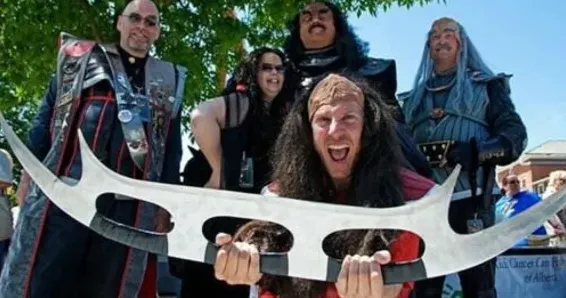Well, I guess I know a thing about Klingon. No, I can’t actually speak it, but I can drop some serious knowledge that’ll make you think I just walked off the set of "Star Trek."

(source :https://www.etsy.com/nz/listing/727039911/massive-4-ft-replica-klingon-batleth)
The Discovery
One day, I was deep into my 10th rewatch of "Star Trek: The Next Generation." Captain Picard was pontificating about something profound (as usual), when Worf barged in, growling in Klingon. It hit me like a photon torpedo: this language is hardcore. I mean, who wouldn’t be fascinated by a language that sounds like it’s made for yelling epic battle cries?
Naturally, I did what any curious person with a Wi-Fi connection would do: I fell down the Klingon rabbit hole. Did you know the Klingon language, or "tlhIngan Hol" (yeah, I picked up a few words), was created by linguist Marc Okrand? It’s not just gibberish; it’s a fully developed language with its own grammar, vocabulary, and even idioms. There’s even a Klingon Language Institute! I mean, these people are dedicated.
The Culture
There are a few syntetic languages made specifically for books and movies.
Synthetic languages, also known as constructed or conlangs, are languages that have been deliberately created rather than having naturally evolved. These languages can be fully functional, meaning they have complete grammatical structures, vocabularies, and can be used for everyday communication. Here are some examples of fully functional synthetic languages:
- Quenya and Sindarin: Created for the fictional world of Middle-earth in Tolkien's novels.
- Na'vi Created for James Cameron's film "Avatar"
- Dothraki and High Valyrian Created for the "Game of Thrones"
- Minionese Developed for the "Despicable Me"
And then there's Klingon developed for the "Star Trek"
Klingon isn’t just a bunch of random sounds; it’s a cultural phenomenon. Klingons are all about honor, combat, and living life with the intensity of a warp core breach. Their language reflects that. For instance, the word "Qapla’" means success, but it’s not just a word. It’s a declaration, a shout of triumph. Imagine ending every email with that instead of "Best regards." Instant upgrade.
The Alphabet
Now, let’s talk about the alphabet. Klingon uses a combination of standard Latin letters and some funky symbols. The letter "tlh" is a single letter in their alphabet. Try pronouncing that without sounding like you’re choking on a tribble. The language even has its own punctuation marks, like the apostrophe, which is used more than you’d think. It’s like a linguistic obstacle course.
The Pronunciation
Speaking of pronunciation, Klingon is not for the faint of heart. There are guttural sounds, back-of-the-throat growls, and lots of sharp, staccato notes. It’s no wonder they always seem like they’re about to start a brawl. Marc Okrand designed it to sound alien and tough, which fits the Klingon vibe perfectly. They don’t say “Hello”; they say "nuqneH" (What do you want?). Friendly, right?
The Fun Facts
Here’s a nugget of trivia for you: the Klingon language has been used in some pretty epic ways. There’s a translation of "Hamlet" in Klingon because, of course, there is. "taH pagh taHbe’," which means "To be or not to be," is a legit phrase in their lexicon. Imagine Shakespeare performed by a bunch of dudes in full Klingon makeup—now that’s high culture.
The Conventions
If you think learning about Klingon is just a solo gig, think again. There are entire conventions where people gather to speak Klingon, dress as Klingons, and generally revel in their shared love for all things Klingon. I’ve yet to attend one, but it’s on my bucket list. Just imagine the street cred I’d get for knowing that "pIqaD" is the name of their writing system, even if I can’t actually write it.
The Payoff
So, what’s the point of knowing all this without speaking it? Well, for starters, it makes me the most interesting guy at "Star Trek" viewing parties. Plus, it’s a gateway into the rich, nerdy tapestry of "Star Trek" fandom. It’s like being part of a secret club where the password is a throaty growl and the handshake involves discussing the finer points of Klingon honor.
In the end, my knowledge of Klingon is like having a superpower I can’t quite use, but it’s still pretty awesome. I might not be able to order a pizza in Klingon, but I can drop some serious trivia bombs that’ll impress even the most hardcore Trekkies. And who knows? Maybe one day I’ll take the plunge and learn to speak it fluently. Until then, I’ll keep my nerd flag flying high, shouting "Qapla’!" at every success, and dreaming of the day I can truly join the ranks of the Klingon warriors.